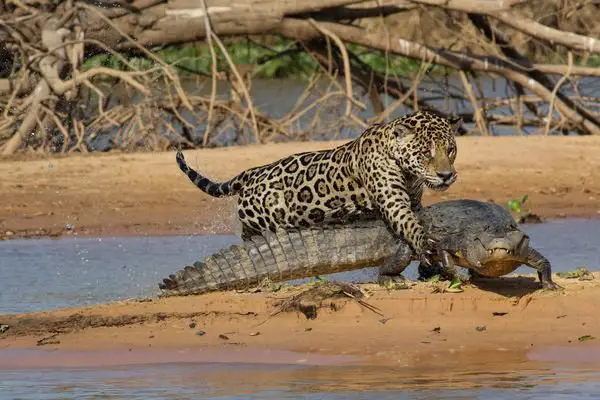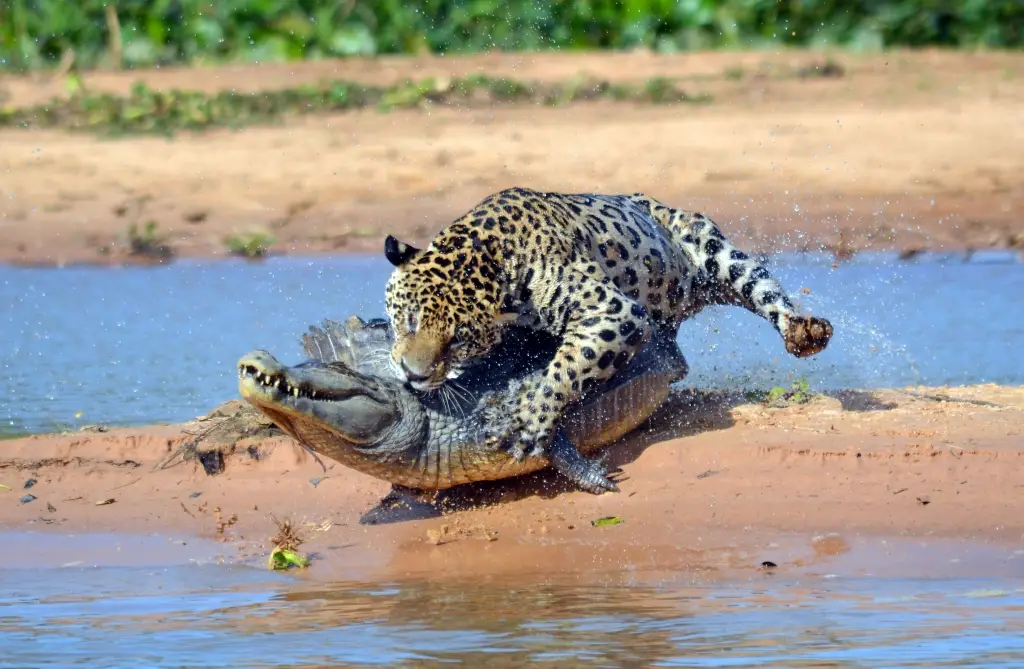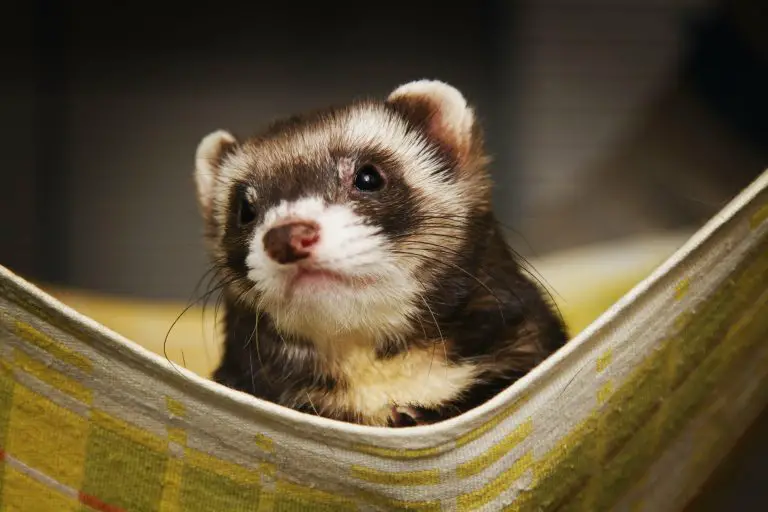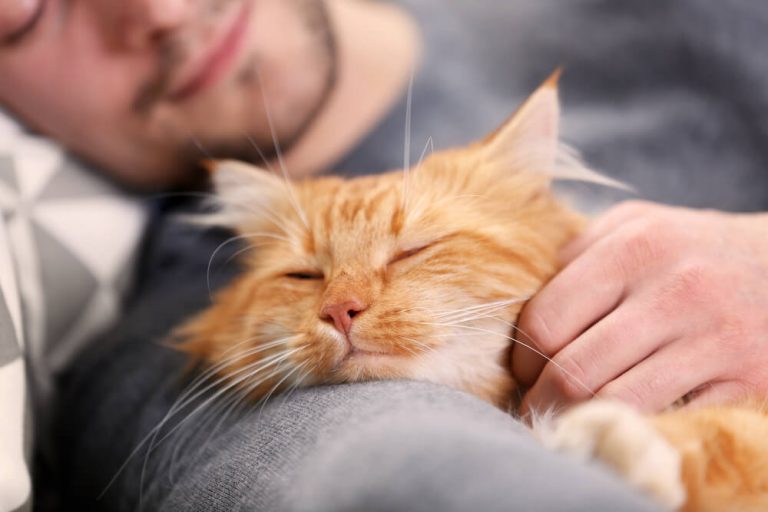Why Do Jaguars Attack Crocodiles?
Jaguars attack crocodiles due to competition for resources and territorial conflicts. These apex predators clash in a battle for survival and dominance in their shared habitats.
As both species rely on the same prey and inhabit similar environments, encounters between jaguars and crocodiles are inevitable. Jaguars possess the strength, agility, and hunting skills to take on crocodiles, leveraging their powerful jaws and quick reflexes to gain the upper hand.
Their attacks on crocodiles serve as a means to secure food sources and defend their territories. Understanding the reasons behind these encounters sheds light on the complex dynamics of predator interactions in the natural world.

Jaguar Predatory Behaviors
Jaguars are known for their formidable hunting skills and unique predatory behaviors. As apex predators, they hold a dominant position in the food chain, allowing them to hunt a wide range of prey including crocodiles. Unlike other big cats such as lions and tigers, jaguars have particular strategies that make them successful hunters. They have a powerful bite force, capable of piercing the thick skin and armor of crocodiles. Moreover, jaguars are highly skilled at ambushing their prey, utilizing stealth and camouflage to get close without being detected.
This allows them to deliver a swift and lethal attack. In addition, jaguars have been observed to employ different hunting techniques in comparison to other big cats. They often prefer to target the head or neck of their prey, aiming for a quick kill. This ensures their own safety as they avoid a potentially dangerous struggle. These unique hunting strategies and their dominant position in the food chain contribute to the jaguar’s ability to take on formidable opponents like crocodiles.
Adaptive Skills In Jaguars
Jaguars possess adaptive skills that enable them to successfully attack crocodiles. One of their key strengths lies in their stealth and surprise tactics. Jaguars are highly skilled hunters, using their excellent camouflage for a successful ambush. They patiently stalk their prey, carefully positioning themselves and staying hidden until the opportune moment. This allows them to get close to crocodiles without detection, increasing their chances of a successful attack.
Moreover, jaguars possess remarkable jaw strength and killing techniques. Their powerful jaws are adapted to deliver a precise and lethal bite, enabling them to pierce through the tough skin and thick armor of crocodiles. By targeting the vulnerable areas, such as the neck or head, jaguars can swiftly incapacitate their prey, ensuring a quick kill.
Additionally, their swimming abilities and river habitats play a crucial role in their ability to attack crocodiles. Jaguars are adept swimmers and are comfortable in aquatic environments. They can stealthily approach crocodiles in the water and utilize their agility to counter the crocodile’s advantage of size and strength. This allows jaguars to effectively engage and overpower their formidable reptilian adversaries.
In conclusion, jaguars’ adaptive skills, including their stealth and surprise tactics, jaw strength and killing techniques, as well as their swimming abilities and river habitats, equip them with the necessary tools to successfully attack crocodiles.
Why Do Jaguars Attack Crocodiles? Unveiling The Truth!
Jaguars are renowned for their remarkable hunting abilities and their ability to take down a wide range of prey. When it comes to jaguars attacking crocodiles, it is not surprising considering the fierce competition for territory and resources in their overlapping habitats.
One of the main reasons behind this behavior is the territorial instinct of jaguars. They fiercely defend their range against other predators, including crocodiles, as they compete for limited space and prey.
Additionally, jaguars have specific nutritional needs that drive their prey selection. While they predominantly feed on mammals like deer and tapirs, instances of jaguars targeting caimans, a type of small crocodile, have also been observed. This behavior might be influenced by the availability of other prey sources or the vulnerability of caimans in certain circumstances.
| Reasons for Jaguar’s Attack on Crocodiles |
|---|
| Territorial instinct and competition for space |
| Nutritional needs and prey selection |
| Instances of jaguars targeting caimans |
Crocodilian Defenses And Jaguar Counters
- Powerful Jaws: Crocodiles possess a set of ferocious jaws designed to crush and immobilize prey.
- Armored Scales: Their tough, scaly skin acts as a natural armor, protecting against external threats.
- Aquatic Agility: Crocodiles are swift swimmers and excel in their aquatic surroundings.
- Jaguar Techniques: To tackle these formidable defenses, jaguars have developed specific strategies.
Jaguars are agile and stealthy hunters, enabling them to navigate through water and exploit vulnerabilities. They utilize ambush techniques and their powerful bite force
to subdue and immobilize prey. By targeting areas that are less protected, such as the head or throat, jaguars reduce the risk of injury. Their acute hearing and vision allow them to anticipate and react swiftly to crocodile movements.It’s important to note that not all jaguar attacks on crocodiles are successful. Crocodiles’ formidable defenses make them formidable opponents. Success rates in jaguar attacks depend on several factors, including the size and strength of the crocodile, the aggressiveness of the jaguar, and the element of surprise. Additionally, habitat suitability and prey availability influence the likelihood of a successful attack.

Ecological Implications
Understanding the impact of jaguar-crocodile interactions on the ecosystem and biodiversity is crucial.
Jaguars play a pivotal role in maintaining the balance of predator and prey dynamics. By targeting crocodiles, they help control their population, as crocodiles can become dominant predators in certain habitats. This suppression allows other species to thrive and promotes biodiversity.
Conservation efforts for both jaguars and crocodiles are essential. Protecting their habitats and establishing conservation programs can contribute to preserving the natural balance of predator-prey relationships. Balancing these efforts is crucial to ensure that both jaguars and crocodiles coexist harmoniously in a sustainable ecosystem.
| Ecological Implications | |
|---|---|
| Impact on the ecosystem and biodiversity | Jaguars control crocodile population, promoting biodiversity and allowing other species to thrive. |
| Conservation efforts | Preserving habitats and establishing programs to protect both jaguars and crocodiles. |
Frequently Asked Questions On Why Do Jaguars Attack Crocodiles? The Truth!
Who Wins Jaguar Or A Crocodile?
Jaguar is usually the winner in a fight against a crocodile due to its agility, strength, and stealthy hunting techniques. It can attack vital areas such as the neck, suffocating the crocodile before it can defend itself.
Why Would A Jaguar Attack A Human?
Jaguars may attack humans if they feel threatened, cornered, or if their habitat is disturbed. It is important to respect their territory and avoid any actions that could be perceived as a threat.
Can A Jaguar Eat A Saltwater Crocodile?
Yes, a jaguar can eat a saltwater crocodile. Jaguars are powerful predators and have been known to hunt and kill crocodiles for food.
Do Crocodiles Attack Unprovoked?
Yes, crocodiles can attack unprovoked. They are known to be aggressive predators and may attack humans or other animals if they feel threatened or hungry. It is important to stay cautious and keep a safe distance from crocodile habitats.
Conclusion
The reasons behind jaguars attacking crocodiles are rooted in their adaptive behavior and survival instincts. While their preference for easy prey does play a role, it is primarily driven by competition for territory and resources. Understanding these dynamics provides valuable insights into the complex relationship between these two formidable predators in their natural habitats.
By recognizing the vital role they play in maintaining balance within these ecosystems, we can strive to protect and conserve these magnificent creatures for future generations.







